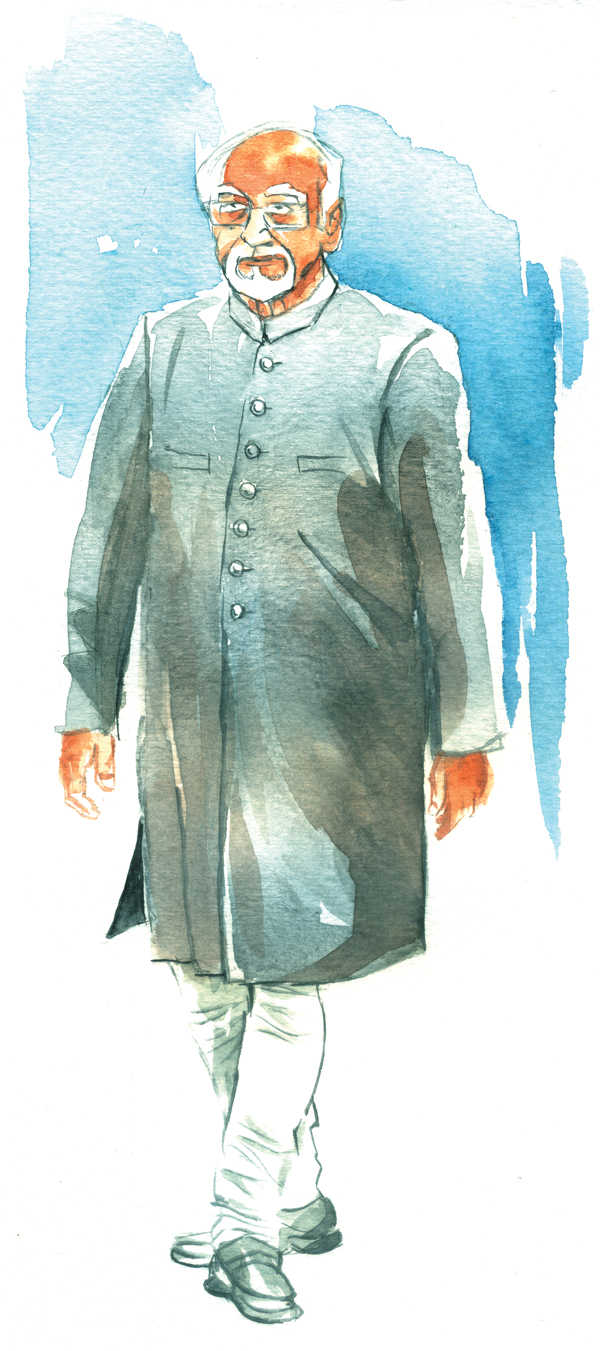
Illustration by Sandeep Joshi
Harish Khare
YESTERDAY, an election was held to decide the new occupant of 6 Maulana Azad Road in New Delhi. This house is the designated residence for the Vice-President of India. The great scholar, freedom fighter, and educationist, Maulana Abul Kalam Azad lived at this address from 1947 till his death in 1958. Till then, the street was called King Edward Road. After the Maulana’s departure, it came to be known as Maulana Azad Road.
Hamid Ansari has lived in this modest but elegant residence for the longest time — 10 years. That is not surprising because he is only the second person in our history to have served two terms as Vice-President. The first one, Dr Sarvapalli Radhakrishnan, lived a part of his tenures at York Road (now Moti Lal Nehru Road).
6 Maulana Azad has had an interesting procession of occupants, and each one of them probably left an imprint on it. Curiously, there was a mosque in the premises, and then a temple got added. But perhaps the most significant addition that got made was during the stay of KR Narayanan.
Soon after that horrible day, December 6, 1992, when our very constitutional order came under severe assault, Vice-President Narayanan bought two paintings, both of the Mahatma. The paintings show the Mahatma in a pensive mood, and each lends a certain spiritual charm to the surroundings. One of the paintings that Narayanan bought hangs in the Chairman’s office in the Parliament House, and the other adorns the wall above the mantle-piece in the drawing room at 6, Maulana Road. None of Narayanan’s successors felt the need to tinker with the arrangement. It would be interesting to know if Hamid Ansari’s successor has different thoughts and ideas and whether the Mahatma retains his place at the Vice-President’s residence.
For 10 years, Hamid Ansari made a model and dignified resident at 6, Maulana Azad Road. His presence in the second highest constitutional office of the land showcased the best of Indian plurality and diversity. But these last three years, he was seen as an incongruity. This incongruity got symbolised by his choice of sherwani as the formal dress.
More than the choice of attire, Hamid sahib was the odd man out. After all, he is a man of ideas, a man who values and reads books, feels at home in the company of the educated. He is familiar with the history of our region and beyond; and, more importantly, he has a sense of history.
A Vice-President has just about no power. But that does not prevent an incumbent from speaking out on issues of national and international importance. Hamid Ansari made his erudite presence felt often. He spoke out against the creeping culture of intolerance and intimidation.
Hamid Ansari’s gentle, dignified presence at the pulpit must have been an eyesore to the new congregation of the closed minds. Now, with a new occupant at 6 Maulana Azad Road, the ruling establishment will have one less irritant to deal with.
* * * * * * * * * * * * * * * *
IT is almost a cliché for our leaders to extol the virtues of “dialogue” even when they continue to talk down to others, that is, when they are not shouting at their adversaries. Much of our public discourse has become a dialogue of the deaf. I say my piece, you say your piece and we put the onus on the other person to try to understand me. Neither of us wants to listen and appreciate the other’s point of view. We are happy with our prejudices and contented with our sense of superior wisdom. We accuse the others of intolerance and, worse, of bigotry.
Try listening. That is Arun Maira’s mantra in this very, very readable book, Listening for Well-Being — Conversations with People Not Like Us. Arun Maira is not a “things-to-do” guru and this is not the kind of books that are displayed prominently at airport bookstores. He is a serious student of public policy and for five years, between 2009 and 2014, he was a member of the Planning Commission.
In a brief foreword to this book, the Dalai Lama notes that along with contemplating and meditating, listening is one of the three “wisdom tools.” This means listening “without preconceived notion and with respect and full attention” to what others say. Another Buddhist sage, Thich Nhat Hanh, has exhorted us: “To know how to love someone, we have to understand them. To understand, we need to listen.”
The book is a rather thoughtful reflection on inadequacies we have injected in our collective affairs, especially with the arrival of social media. The new tools of social media only help us reinforce our prejudices and passions and we end up creating more and more ugliness around us.
Our failure to listen — rather our refusal to listen to those who are not like us — is producing great social disharmony, endangering our security. Our politics, our media, and our national discourse end up creating noxious bitterness.
Arun Maira ends the book with a simple reminder that we all like to pose ourselves a question: “What sort of a world are we leaving behind for our grandchildren?” This question has become a cliché. Yet, the question remains urgent and relevant. Therefore, while we do listen to our own aspirations, “we must also listen to the aspirations of people not like us for the better world they want to leave for their grandchildren.” Well put.
* * * * * * * * * * * * * * * *
JUST when we thought that everybody was succumbing to a creeping madness, there emerges evidence of sanity. The evidence has a name: Additional Sessions Judge Sidharth Sharma. It appears that Judge Sidharth Sharma had before him the case of Kashmiri ‘separatist’ leader Shabir Shah, who has been arrested by the Enforcement Directorate for possessing undisclosed foreign funds.
The Enforcement Directorate’s lawyer challengingly asked Mr Shah to chant Bharat Mata Ki Jai in order to prove his innocence and his patriotism. Judge Sidharth Sharma correctly and promptly intervened and ticked off the lawyer that the courtroom was not a “television studio.”
Judge Sidharth Sharma’s rebuke for the ED was not at all out of place; indeed, it was way overdue. It is bad enough that our political leaders use the courts to settle scores with their rivals, it a double tragedy that some lawyers have come to believe that a “cause” takes precedence over the law and etiquettes and protocols of the courtroom. “Patriotism” and “nationalism” are the two latest “causes” which excite a section of lawyers who take it upon themselves to pronounce a person guilty or innocent. This unfortunate trend, in fact, was first noticed in Srinagar where a very vociferous bar association has virtually rendered the courts of law defunct.
Our nation faces many grave challenges but none of these challenges would be defused by resorting to extra-legal tactics or reducing our judicial process to a “kangaroo court.”
* * * * * * * * * * * * * * * *
I am impressed with the tagline in the Haryana Government’s publicity campaign on the completion of its 1,000 days in office. There is a rather clever play on words in the Chief Minister’s name to produce the ‘raj manohar’ slogan. This is very creative ad work.
In the process, it need be noted that Manohar Lal, perhaps, becomes the first major BJP functionary in the Age of Modi to be allowed a spot of self-glorification. So far, this trick has been reserved for the Prime Minister.
The chief minister is too self-effacing to be suspected of wanting to promote a personality cult and let us hope that the commissars in Delhi do not take a different view.
Till then, let me raise my cup of coffee to Manohar Lal’s creative team. Join me.



























